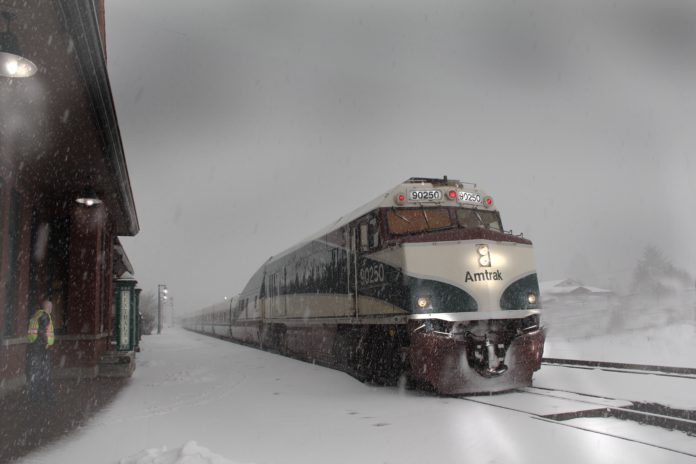

Amtrak recently announced that a long-awaited passenger train will cross Colorado’s Front Range. The announcement came amid speculation about how the American Jobs Plan could be used to bolster the nation’s rail networks. Although Colorado boasts thousands of miles of railroad track, it’s unclear how funding for those infrastructure developments might help Colorado.
Amtrak President Stephen Gardner announced at an April 12 news conference that the so-called Front Range Corridor between Pueblo and Cheyenne, Wyoming, could see passenger service, and the members of the conference including representatives from Amtrak and the Front Range Passenger Rail Commission among others, pledged to make the corridor project a reality through a combination of federal, regional and state funding. The passenger railroad company plans to expand its lines across the country and bring service to more than 100 communities not currently on Amtrak routes.
Just days before the announcement, on April 9, state lawmakers introduced SB21-238, which would establish a Front Range Passenger Rail District. The special district would plan, design, develop, finance, construct, operate and maintain a passenger rail system covering an area stretching from Wyoming to New Mexico.
The sudden emphasis on rail as a solution to Front Range traffic might be sparked by earmarks within the American Jobs Plan for railroad and transportation funding. Unveiled at the end of March, President Joe Biden’s American Jobs Plan puts forward possible solutions for a series of issues surrounding the American economy in areas such as transportation, housing, wages, manufacturing, job creation and infrastructure. Large sums of money will be used to address critical infrastructure such as bridges, ports, airports and highways — another aspect is to invest in rail infrastructure across the country.
Colorado could be on the list of places for improvements. The American Society of Civil Engineers noted on its 2020 annual infrastructure report card that Colorado’s rail system is adequate, but “passenger rail seeks growth in funding to support underserved regions. Overall, investment needs require more development across the whole spectrum of freight and passenger rail.” However, decades of declining public investment in roads, bridges, rail and transit systems have left a backlog of repairs that reach into the trillion-dollars range. Unlike highways and transit systems, rail networks lack multi-year funding streams to build new lines in “high-potential locations.”
Andrew Reitman, a member at Hall & Evans whose practice focuses on transportation, construction and hospitality, said he’s looking at the proposed aspects of the American Jobs Plan with caution regarding its potential benefit for Colorado and the existing rail networks here. Much of the bill focuses on infrastructure to the coasts, he said, such as the Northeast Corridor, one of the nation’s busiest rail networks. He also wondered if the Colorado Department of Transportation might first use any funding on other existing infrastructure such as improving road conditions.
One of the hurdles for Colorado rail projects is the amount of funding that might be directed toward strictly freight-hauling railroads, such as the Union Pacific or Burlington Northern Santa Fe, which own most of the tracks in the state. “The way the bill is looking now, I’d be surprised if Congress was looking to hand money to either of those large corporations,” Reitman said.
With those freight rail companies out of the picture, RTD could instead be a main focus for a rail project funded by the American Jobs Plan, he said. The large sum set aside to help modernize equipment and improve and expand systems, could mean help for RTD. Long-standing plans to expand RTD’s transit operations around the metro area, such as a commuter line going from Union Station north through Boulder, could be a possible recipient of funding, he said.
However, Reitman also noted the high price tags that go along with rail projects as a reason not to get too excited about projects in Colorado. The plan sets aside proposed billions for improving repair of public transit, intercity rail projects and Amtrak’s network across the country, but as an example of a possible rail project, projections for a Ski Train paralleling I-70 through the mountains have all been in excess of $15 billion. “The fact that there’s only $85 billion for modernizing transit and helping these systems helps get a sense for how much affect that would have, in the aggregate, for Colorado,” he said.
Reitman noted other obstacles to development, such as right of way, rail grade crossings, architecture and design of tunnels, stations and other facilities, and the expense of running equipment. Colorado has also had a difficult history with taxes supporting general infrastructure, Reitman said. Without some change to the Taxpayers Bill of Rights, and without extensive input from major sponsors such as the federal government, Reitman said he was unsure about rail development in parts of the state.
However, the jobs plan could be beneficial to the state in other ways, Reitman said, such as with improvements to bike lanes, increased electronic vehicle production and funding for plugging old oil and gas/mining sites.
In terms of the proposed rail system in the Front Range, a Colorado State University feasibility study in 2018 listed the proposed commuter rail line running four times a day on existing rails with high-speed locomotives found the proposal feasible but at a total estimated cost of over $117 million to build and over $32 million to operate the first year. “While a rail line will not eradicate congestion, even a 20% reduction would save over an average $445 million [per] year,” the study states.
Regardless of the cost, and whether larger rail projects come to fruition in Colorado, Amtrak CEO Bill Flynn told reporters the company is committed to the Front Range rail project and that it is not contingent upon American Jobs Act funding.

